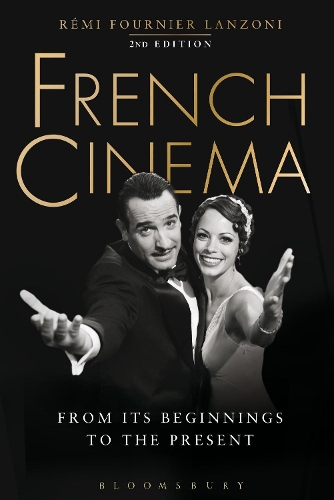
French Cinema: From Its Beginnings to the Present
(Paperback, 2nd edition)
Publishing Details
French Cinema: From Its Beginnings to the Present
By (Author) Rmi Fournier Lanzoni
Bloomsbury Publishing PLC
Bloomsbury Academic USA
22nd October 2015
2nd edition
United States
Classifications
Tertiary Education
Non Fiction
791.430944
Physical Properties
Paperback
632
Width 152mm, Height 230mm, Spine 30mm
940g
Description
To a large extent, the story of French filmmaking is the story of moviemaking. From the earliest flickering images of the late nineteenth century through the silent era, Surrealist influences, the Nazi Occupation, the glories of the New Wave, the rebirth of the industry in the 1990s with the exception culturelle, and the present, Rmi Lanzoni examines a considerable number of the world's most beloved films. Building upon his 2004 best-selling edition, the second edition of French Cinema maintains the chronological analysis, factual reliability, ease of use, and accessible prose, while at once concentrating more on the current generation of female directors, mainstream productions such as The Artist and The Intouchables, and the emergence of minority filmmakers (Beur cinema).
Reviews
Rmi Fournier Lanzonis French Cinema. From Its Beginnings to the Present had already established itself as the authoritative reader for anyone serious about teaching and studying French cinema. This second edition not only brings us up to date the significant French films produced since the beginning of the twenty first century but it also provides welcome and much needed sub chapters dealing with French women filmmakers, Beur cinema, and the recent international accomplishments of French cinema. Written in an engaging, jargon free, and reader friendly style, Lanzonis book succeeds in connecting the history of French cinema to the history of France, its peoples, and its institutions. * Alain-Philippe Durand, Professor of French and Director of the School of International Languages, Literatures, and Cultures, University of Arizona, USA *
The new edition of French Cinema brings us into the new millennium, as it sheds light on the new generation of directors, their diversity, freedom of expression, their use of new mediums to bring international success to French films. It is captivating. The historical, social and political background presented at the head of each chapter gives a deep understanding of the films and the directors. This book is the perfect companion for film students, professors, as well as anyone who loves cinema. * Hlne Laroche Davis, Professor of French and Film Studies, Notre Dame de Namur University, California, USA, and author of Robert Desnos: Une Vois, Un Chant, Un Cri *
Fournier Lanzoni (Wake Forest) updates the first edition of this model history of French cinema (CH, Sep'03, 41-0198) with an 84-page chapter titled The New Millennium. As in the earlier edition, he summarizes the changing social, political, industrial, and technical contexts of the films. After a review of pioneering French women directors, he focuses on the controversial work of Catherine Breillat and Virginie Despentes, and on Nomie Lvovakys less steamy and more complex narratives. Especially timely is his introduction to beur cinema (i.e., work by second-generation filmmakers of Maghrebi descent), politically aware examinations of Frances colonial past and its present citizens tension between integration and ethnic diversity. He surveys Abdellatif Kechiches dramas of the banlieue and Rachid Boucharebs reworking of French history. Fournier Lanzoni concludes with the nations reemergence on the international scene, as exemplified by Michel Hazanaviciuss Oscar-winning silent The Artist. Updated appendixes include France's Cannes award winners, the Csar Awards, box office toppers, and the country's successes at the Oscars. This second edition replaces the first. Summing Up: Recommended. All readers. -- M. Yacowar, University of Calgary, Canada * CHOICE *
Author Bio
Rmi Fournier Lanzoni, a native of Lyon, France, is Associate Professor of Romance Languages at Wake Forest University, USA. He has written several books, among which are French Cinema: From its Beginnings to Present (Continuum, 2004) and Comedy Italian Style: The Golden Age of Italian Film Comedies (Continuum, 2009) as well as several articles on Italian cinema.
